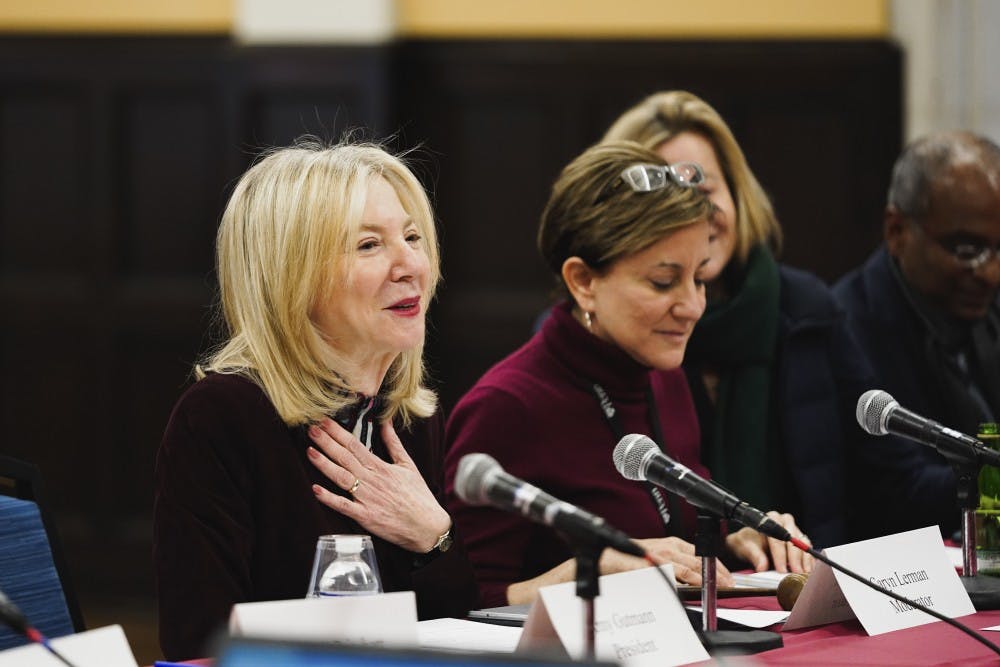Graduate student leaders raised concerns about the lack of attention given to graduate student-specific issues at the University Council Open Forum Wednesday. The students called on top administrators to address the lack of space given to cultural groups, the need for more first-generation, low-income graduate student resources, and the need for more clarity surrounding Penn's sexual misconduct policies.
The University Council holds an Open Forum every year at which any member of the Penn community can raise issues to the Council. President Amy Gutmann, Provost Wendell Pritchett, faculty, and undergraduate and graduate student representatives have seats on the Council.
Students urged Penn to give the three cultural houses, which are housed in the ARCH basement, more space and resources. Three graduate students at the forum described staff members in the cultural centers — La Casa Latina, Makuu, and the Pan-Asian American Community House — as “overworked” and “underfunded," and advocated for more funding to increase staff.
First-year chemistry Ph.D student Christopher Johnny, who is a member of the Black Graduate and Professional Student Assembly, said the three staff members at Makuu are "stretched-thin."
Their criticism comes after undergraduate students in the 6B, Penn's main undergraduate minority group coalition, met with administrators to lobby for more space beyond the ARCH basement for the three cultural centers.
Third year master's student in Nanotechnology Francisco Saldaña, a member of the Latin American Graduate and Professional Students Assembly, said extra funding for La Casa could help them recruit a staff member who could specifically connect graduate students to La Casa.
“Students can feel lost and overwhelmed particularly since many graduate programs are very isolating and have very few Latinx students,” Saldaña said.
Saldaña also advocated for more physical space for La Casa, adding that the space cannot seat more than 10 people. First-year master's student in Nonprofit Leadership Sanjana Dalmiya, who is a member of the Pan-Asian Graduate Student Association, said PAACH's current space is not visible, given its less prominent location in the ARCH basement.
“A bigger space will not only help spread visibility of our community house but also provide various resources to a larger number of students,” Dalmina said.
Undergraduate students sitting on the University Council — including UMOJA representative and College sophomore Martha Gakunju and Asian Pacific Student Coalition representative Katherine Hsu — echoed these sentiments.
“As someone who goes to PAACH quite frequently, I noticed that there is simply not enough space for even undergrad students, much less grad students,” said Hsu, who is a College and Wharton sophomore.
Graduate student presenters at the forum also spoke about the absence of resources for FGLI graduate students.
First-year master's student in Nonprofit Leadership Sarah Simi Cohen, a member of the First-Generation Low-Income Queer group, said the FGLI resources dedicated to undergraduate students leave many graduate students with “little to no institutional assistance.” In spring 2018, Penn announced plans to create the Penn First Plus office for FGLI undergraduate students.
“An undergraduate student receiving FGLI resources can decide to matriculate into any G12 school and lose an immense amount of resources,” Senito said.
Senito said FGLI-Q graduate students need resources comparable to undergraduate FGLI resources such as food pantries, travel funding, cap and gown purchasing, and spring break food money.
During the open forum, grad students also raised concerns about the vagueness of Penn's proposed changes to its sexual misconduct policies.
On Jan. 22, Penn officially proposed a policy to centralize all reports of sexual misconduct in a single office. The policy also proposed creating a new administrative position, the Associate Vice President for Equity and Title IX Officer, who will lead the office.
Following the release of the draft document, students from the GAPSA Sexual Harassment Reform Committee and Graduate Employees Together — University of Pennsylvania submitted comments to Chief Diversity Officer Joann Mitchell asking for more clarification regarding the proposed guidelines.
First-year Ph.D. student in Social Welfare Alicia Chatterjee, who is a member of GAPSA's Sexual Harassment Reform Committee, said the proposed changes require more transparency.
“We do not understand the role of the dean in investigations and resolutions of complaints and thus how the proposed policy differs from the current one. We ask that the role of the dean be explicitly stated,” Chatterjee said.









